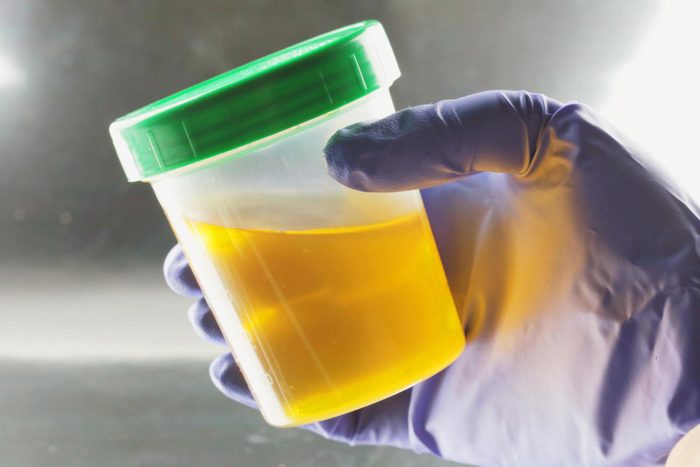Here’s Why Pee Smells the Way It Does, According to a Urology and Kidney Doctor
Updated: Aug. 02, 2023

Ever wondered why urine smells that way? A Cleveland Clinic urology doctor unlocks the answer to this common curiosity.
You may not give your pee a sniff-test every time you go, but having a general idea of your personal norm—and knowing when things are a little off—could reveal a few things about your health…especially if you’re wondering, “Why does my pee smell?”
Here’s How Many Times You Should Actually Pee in a Day, a Urologist Reveals
What does healthy pee smell like?
Of course everyone’s urine baseline scent can vary a bit, but there’s a common smell that would make it easily identifiable to most anyone that what they’re smelling is, well, pee.
So what makes pee the smell the way it does? “Generally speaking, urine is made of the same components—mostly water with salt, electrolytes and urea [what your body produces when it breaks down protein],” Petar Bajic, MD, director of the center for men’s health at the Cleveland Clinic’s Glickman Urological and Kidney Institute, tells The Healthy @Reader’s Digest. “Mostly it smells the same but varies based on level of hydration, foods you may have eaten, and various supplements and medications,” Dr. Bajic explains.
In other words, it’s normal for your pee to have a scent, and it can change depending on various factors, including the amount of waste products in your pee. The fewer leftovers, the less of an odor it’ll have. But if there’s more waste and less water in your urine, proportionally speaking, it may have more of an ammonia-like odor.
Foods can change the odor (and color) of your pee. Just knowing that may relieve your alarm over any smells that have you concerned about the whiff you’re getting. Fun fact: Asparagus and coffee are the most common foods that impact urine odor, Dr. Bajic adds.
There’s no difference in what smells “normal” between the sexes, either, he notes.
This Urine Color Chart Reveals Exactly What Your Pee Color Means
What does the smell of your urine tell you?
Dr. Bajic says that a sweet odor from your pee could indicate diabetes or a rare condition known as maple syrup urine disease. The National Institutes of Health (NIH) describes maple syrup urine disease as “a rare but serious inherited condition” that renders the body unable to process some amino acids from protein-rich foods, which the NIH says “can cause a harmful build-up of substances in the blood and urine.”
Foul-smelling urine might indicate a urinary tract infection (UTI), particularly if it’s cloudy and you have other bothersome urinary symptoms, he adds.
Peeing at Night? What Frequent Urination Says About Your Health
So why does my pee smell?
If things aren’t smelling like usual, it could be from:
- Bladder inflammation, or cystitis
- Dehydration
- Diabetic ketoacidosis
- Douching
- Gastrointestinal-bladder fistula, which the Cleveland Clinic describes as an abnormal opening between the bladder and another body part, such as the reproductive organs
- Kidney infections
- Liver failure
- Maple syrup urine disease
- A metabolic disorder, like type 2 diabetes
- Urinary tract infection (UTI)
Not every change in odor is serious. Urinary tract infections are notorious for making you urinate more frequently—or feeling like you have to. They can also cause pain when you pee, especially in the middle of your back. If you experience those symptoms along with an odd odor, you may have an infection that could be easily treated.
Can You Have Sex With a UTI? Here’s Current Wisdom from Women’s Health Doctors
Should I be worried about smelly urine?
Dr. Bajic suggests that much of the time, a change in urine odor is nothing to fret about. You’ll need to see a doctor—or snag an over-the-counter urine infection test—to know for sure. If changes persist and don’t seem linked to your diet, or a medication or supplement, a quick visit or a test can help you figure out what’s up.
There’s one situation that should get you hauling to a doctor, Dr. Bajic says. “Blood in urine is the big one that should always prompt a urologist evaluation,” he says. Keep in mind that if you’re menstruating, this is likely not a worry.


















